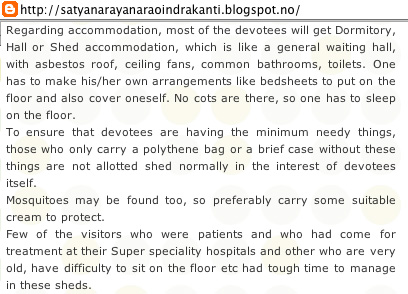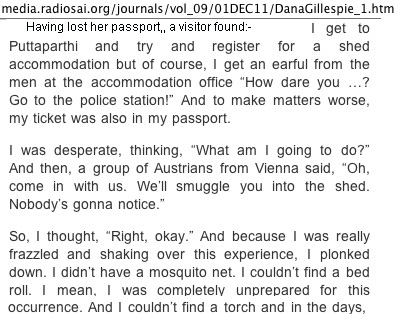



Seasoned visitors have had to put up with bossy and obstructive 'servitors' patiently for years on end. A very devoted young US lady known as 'Divya' (Eileen Weed) lived for long periods in the apartment of Sai Baba's sister Venkamma. Since her disaffection in 2005 after two decades of living in India, mostly at the Sai Baba ashrams, she published a long series of letters she wrote from 1984 onwards to her parents. Here are some excerpts:-


The public relations office at Prashanthi Nilayam
The staff at Sai ashrams usually offered a modicum of neutral,
fact-based guidance to visitors which, if followed to the letter, would
go some way in protecting them from unfortunate experiences while staying
there. They warned that one should look carefully after one's personal property
at all times, for thieves cannot be kept out of the ashram. They also
repeated Sathya Sai Baba's advice not go outside to Puttaparti village to shop or socialise.
Had they told the details of some previous incidents, visitors would surely
take this advice much more seriously than they mostly do. The number of disappearances and murders of foreign devotees both in the village
and inside the ashram are known to few, but had the not been buried assiduously, they would surely cause major doubts about the supposed 'divine protection' Sai Baba guarantees his devotees.
However, the offices were most often staffed mostly by men of low calibre, often by Indian chauvinists who put any foreigners to whom they harboured a dislike through various unnecessary hoops. Visitors had to watch their step carefully as there were plenty of scorpions and snakes, both literal and figurative. All devotees soon got used to the kind of 'double-accounting'
whereby two versions of the facts exist, one close to reality for insiders who cannot avoid knowing something -
and another that defies and cloaks the actual facts. The ashram authorities hid all potentially negative
information, or - when it began to leak out - hushed it up by any means available. Not infrequently the only solution they find is to send away all visitors from the ashram on very short notice.
They always took foreign passports from visitors (on the pretext that the local police required to see them, which seemed completely bogus). The public relations operation was ostensibly to provide information to visitors about the ashram, its ruotines and requirements and so forth. In fact it also functioned as a information-gathering service from the ashram officials and Sathya Sai Baba. One had to fill out extensive forms with personal information, all of which would no doubt help Sathya Sai Baba to decide to whom it was worth giving interviews (primarily those with good positions and evident financial resources - who were often those selected for interviews on occasions where a list of invited interviewees was issued some time before the event. (I was on such a list, being a university teacher). Sai Baba could learn in advance many details about those who were in any national group (and the head of the ashram and others would speak to him regularly each morning before darsan). This enabled him to appear to know things that would seem 'omniscient' to the trusting aspirant. (In additions, of course, he collected countless private letters in the darshan lines from followers which must have informed him of otherwise unknowable facts about the writers, who were identifiable through their names (and if need be most likely cross-checked with the public relations office files).